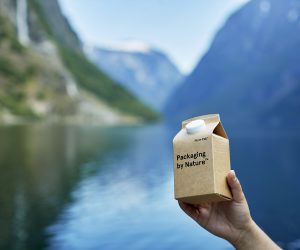

Sustainable Packaging News Special Interview feature with Luca A Zerbini
Luca A. Zerbini is the Co-Founder and Managing Partner of Peak Point Partners, a venture capital fund at the cross roads of technology and sustainability.
- How “sustainability aware” would you say that the packaging industry is as a whole, and what steps should companies take to maintain the current momentum towards achieving 100% sustainability?
‘In Europe the packaging industry is highly aware of the importance of sustainability; some European players are subsequently leading the industry (for example Amcor, Mondi, Tetra Park, Elopak, SIG) thanks to their innovation capabilities and commitment to sustainability. Moving forward, companies must prioritise this global initiative and re-evaluate their own services. Only by accepting our own responsibilities can the sector as a whole achieve 100% sustainability.’
- In your opinion what have been the most important developments in terms of the drive for greater recycling and bio-degradable packaging?
‘The most important innovations I’ve seen in driving greater recycling and bio-degradable packaging have been in flexible plastics. More specifically, the development of a recyclable pouch for wet petfood by Amcor and Nestle Purina and the 100% paper bottle by Pulpex (which is 100% biodegradable, recyclable and compostable).’
- What do you consider to be the most promising developments and key opportunities for the packaging industry at this time?
‘The packaging industry must continue working towards the 100% recyclability goal by 2025 from a material perspective. The most promising developments in this area are in PA substitution (e.g., meats and hard cheese) and paper alternatives (e.g., snacks and confectionary). Beyond converters, it’s key to get FMCG and retailers’ engagements, continue investing in recycling infrastructure (EPR, Plastic Tax) and consumer education with regards to where and how they can recycle.’
- What do you believe the key drivers for change are in the sector, and how much will the on-going pressure for greater sustainability affect the industry’s productivity and profits?
‘Key drivers for change are consumer and customer expectations, regulations and opportunities for differentiation. In more commoditised verticals (e.g., snacks, confectionary, HPS), this will bring even further margin pressure as alternatives are becoming more competitive. Meanwhile, in more differentiated categories (e.g., coffee, pet food, pharmaceuticals), sustainability can drive promising innovation and differentiation – consumers are willing to pay a premium.’
- Our readers are keen to understand more about the latest trends that are shaping the packaging industry and what you consider to be the most innovative strategies so far in promoting the circular economy?
‘The notion of a circular economy has become an increasingly prominent part of the packaging industry’s everyday agenda over recent years, in large part thanks to the efforts of the Ellen MacArthur Foundation. Examples of the most innovative strategies so far in promoting a circular economy include the increased use of PCR (Post Consumer Recycled) materials (e.g., 100% rPET or fully recycled bottles) and the reuse of containers in rigid plastics (for example, 40% of the Coke bottles in Brazil are created from reused materials). Meanwhile, beyond closed-loop recycling, the industry is finding more opportunities to re-use materials in downcycle applications (e.g., pipes, benches, beams etc).
- How do you see the Covid 19 pandemic affecting overall production and investment in the packaging industry?
‘Covid-19 has had a positive effect on the packaging industry as people were forced to eat more at home, thus increasing the consumption of packaged goods. There have been impressive value chain efforts to avoid stockouts and supply enough packaging so as to respond to this increased demand, including higher investments and innovations. Generally, the industry has expanded and Covid-19 has inspired continued investments into the industry.’
- What is your view on how Brexit has affected the packaging industry in the UK and Europe, both in the short and long term?
‘Brexit has required multiple preparations for substantial stock availability on both sides of the new UK-EU border in order to deal with potential disruptions and delays, particularly for essential goods and medicines. In the long term, Brexit will favour the localisation of packaging production in the UK, so as to avoid exchange rate volatility and additional duties at the border. In practice, this will mean increased costs for UK consumers, who will have to pay a premium for imported goods and for the increased investments required.’
- How is the new US administration likely to influence sustainability and the global movement to reduce the threat of climate change?
‘Executive orders signed by President Biden put the environment squarely at the heart of US federal policy – and for good reason. The future competitiveness of the US economy is at stake and climate action is an effective way to boost jobs, prevent future systemic shocks and maintain US leadership on a global scale. Growing evidence shows that investment in ‘green’ industries like electric vehicles and renewables will boost GDP as we emerge from the Covid-19 crisis.
The US has re-entered the Paris agreement and over 70% of the global economy has now set targets to reach net-zero emissions. Given the size and relevance of the US, we can achieve our global climate targets with the drive and support of the Biden administration.’
- Just how much are consumers driving the need for greater sustainability and transparency in your view?
‘Consumers are becoming increasingly demanding in terms of sustainability and transparency. Similarly, thanks to the widespread availability of information through the internet, documentaries and social media, critical insights are readily accessible. Excess of information, greenwashing and misrepresentations of the truth have been issues in the past but I believe that people are now better equipped with reliable facts, allowing them to navigate around these hurdles and understand the power of their buying choices.’
- If you could give our readers just one piece of advice in relation to achieving greater sustainability at this time, what would it be?
‘Take the time to understand the most important issues (climate change, sustainably packaging etc) and make everyday decisions that support sustainability. That may require paying a premium but try to support the cause as much as you can; meanwhile, leveraging government subsidies that may be available (e.g., solar panels, electric vehicles) would be a positive step in the right direction. The more people care, the more sustainability will become the driving force of business, governments and economies.’
To find out more, please visit www.peakpointpartners.vc





